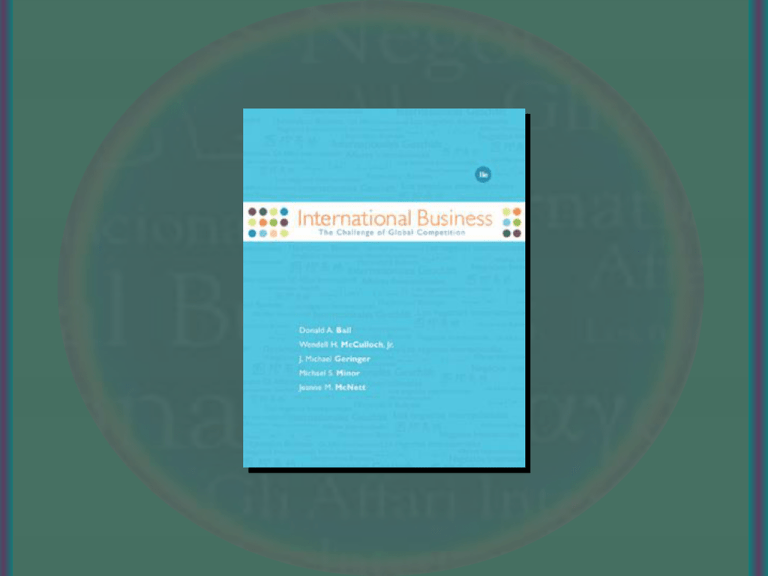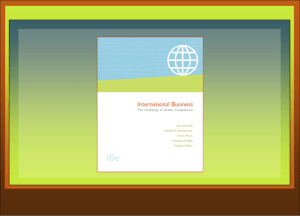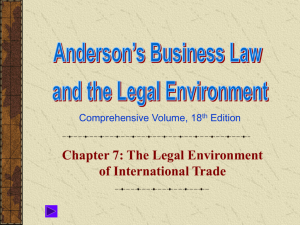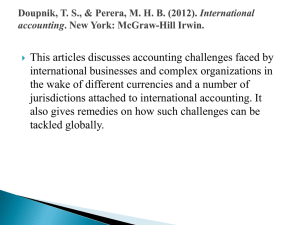
chapter ten
Legal Forces
McGraw-Hill/Irwin
International Business, 11/e
Copyright © 2008 The McGraw-Hill Companies, Inc. All rights reserved.
Learning Objectives
Discuss the complexity of the legal forces that
confront international business
Recognize the importance of foreign law
Explain contract devices and institutions that
assist in interpreting international contracts
Recognize the need and methods to protect your
intellectual properties
10-3
Learning Objectives
Discuss enforcement of antitrust laws
Explain the risk of product liability legal actions,
which can result in imprisonment for employees or
fines for them and the company
Discuss U.S. laws that affect international
business operations
10-4
International Legal Forces
• Rule of law allows foreign
businesses to know interests will
be protected
• Public International Law
– Legal relations between governments
• Private International Law
– Laws governing transactions of
individuals and companies that cross
international borders
10-5
Sources of International Law
• The most important source is found in
bilateral and multilateral treaties between
nations
– Treaties are agreements between countries,
which may be bilateral (between two countries)
or multilateral (involving more than two
countries); also called conventions, covenants,
compacts, or protocols
– United Nation’s International Court of Justice
creates law when it decides disputes
10-6
Extraterritoriality
• A country’s attempt to apply its laws
to foreigners or nonresidents and to
acts and activities that take place
outside its borders
– Not done through force, but by
traditional legal means
10-7
International Dispute Settlement
Litigation in the United States
well-developed court systems that facilitate
litigation
One reason many people outside the
U.S. dislike litigation in the U.S. is the
process of discovery
Unlike most other countries, the U.S.
has two major court systems
The federal court system and the
state court systems
10-8
Performance of Contracts
• United Nations Solution
– Many countries, including the U.S., have
ratified the UN Convention on Contracts
for International Sales of Goods (CISG)
– CISG established uniform legal rules to
govern international sales contracts and
the rights and obligations of the buyer and
seller
– CISG is automatically applied to all
contracts
10-9
Performance of Contracts
• Private Solution: Arbitration
– Instead of going to court in any country,
companies may opt for arbitration
• A process, agreed to by parties to a dispute
in lieu of going to court, by which a neutral
person or body makes a binding decision
• Generally faster
• More informal
• Confidential
• Less expensive
10-10
Enforcement of Foreign Arbitration Awards
• The UN Convention on the Recognition and
Enforcement of Foreign Arbitral Awards
– The U.S. and most UN member-countries of
have ratified this convention
– Binds ratifying countries to compel arbitration
when the parties have so agreed in their
contract and to enforce the resulting awards
10-11
Intellectual Property: Patents, Trademarks,
Trade Names, Copyrights, and Trade Secrets
Intellectual property includes
Patents
Trademarks
Trade names
Copyrights
Trade secrets
All result from the exercise of
someone’s intellect
10-12
Intellectual Property
Patents (Protection)
International Convention for the
Protection of Industrial Property
European Patent Organization (EPO)
The World Intellectual Property
Organization (WIPO)
10-13
Intellectual Property
Trademarks
Protection varies by country, 10 to 20
years
Madrid Agreement of 1891
General American Convention for
Trademark and Commercial Protection
Bilateral basis in friendship,
commerce, and navigation treaties
10-14
Intellectual Property
Trade Names
Protected in countries that adhere to the
Convention for the Protection of Industrial
Property
Copyrights
– Protection provided under the Berne
Convention of 1886 adhered to by 77 countries
– Universal Copyright Convention of 1954
adopted by 92 countries
10-15
Common Law or Civil Law?
Common Law
Jurisdiction has
more power to
expand rules to fit
particular cases
Civil Law
Jurisdiction is
bound by the
words in the
code
Much more
predictable
10-16
Legal System Differences between
Europe and United States
Europe
Legislation is rarely amended and
regulations are rarely revised
Courts are not as often asked to give their
interpretations
If they are, the decisions are rarely
appealed
United States
Laws and regulations are constantly being
amended or revised by legislatures and the
agencies
10-17
Legal System Differences between England
and the U.S.
England has a split legal profession with
barristers and solicitors
England has no jury for civil court
actions
Contingency fees less common in
England
Award of costs to the winner in civil
litigation standard in England
Pretrial discovery differs
10-18
Standardizing Laws
• Many attempts have been made to standardize
laws among various countries
• International business flows much better with a
uniform set of rules
• Attempts include
– Tax conventions and treaties
– Antitrust cooperation
– International Center for Settlement of
Investment Disputes
– UN Convention on International Sale of Goods
– International Organization for Standardization
(ISO)
– International Electrotechnical Commission (IEC)
10-19
Taxation
• Nonrevenue tax purposes
– To redistribute income, discourage
consumption of products such as tobacco
and alcohol, and encourage purchase of
domestic rather than imported products
10-20
National Tax Approach Differences
• Tax Levels
– Range from relatively high in some
Western European countries to zero in
tax havens
– Some countries have capital gains taxes,
and some do not
• Capital gain is realized when an asset
is sold for an amount greater than its
cost
10-21
National Differences of Approach
• Tax Types
– Capital gains tax
– Income tax
• Common in industrialized countries
– Value-added tax
• Tax based on the value of goods and
services
• Used in Europe
– Unitary tax
10-22
Taxation
10-23
Tax Laws and Regulations
• Complexity of national tax systems
differs
– Many consider tax laws and regulations of the
U.S. the most complex
• Compliance with tax laws and their
enforcement vary widely
– Germany and U.S. strict, Italy and Spain
relatively lax
• Other differences include
– Tax incentives, exemptions, costs,
depreciation allowances, foreign tax credits,
timing, and double corporate taxation
10-24
Taxation
Tax Treaties or Conventions
– Treaties between countries that bind the
governments to share information about
taxpayers and cooperate in tax law
enforcement, often called tax conventions
– The U.S. has tax treaties with over 50
countries
10-25
Taxation
• National Tax Jurisdiction
– A tax system for expatriate citizens of a
country whereby the country taxes them on
the basis of nationality even though they live
and work abroad
• Territorial Tax Jurisdiction
¯ Expatriates are exempt from their country’s
taxes
10-26
Antitrust Laws
• Antitrust laws
– Laws to prevent price fixing, market sharing,
and business monopolies
• Competition policy
– The European Union equivalent of antitrust laws
• The U.S. and the EU have attempted to
enforce their antitrust laws extraterritorially
• Japan’s Fair Trade Commission
– the “toothless tiger”
– Japanese companies are incorporating antitrust
thinking into strategy
10-27
Tariffs, Quotas, and Other
Trade Obstacles
Purposes of
tariffs
To raise revenue for
government
To protect domestic
producers
Quotas limit the
number or
amount of imports
For protection
Other trade
obstacles include
Health requirements
Packaging
requirements
Language
requirements
Weak patent or
trademark protection
Quarantine periods
Voluntary Restraint
Agreements
10-28
Torts
Product Liability
– Standard that holds a company and its officers and
directors liable and possibly subject to fines or
imprisonment when their product causes death,
injury, or damage
Strict Liability
– Standard that holds the designer or manufacturer
liable for damages caused by a product without the
need for a plaintiff to prove negligence in the
product’s design or manufacture
10-29
U.S. Laws That Affect U.S. Firms’
International Business
• Federal Employment Laws
– Title VII of the CRA of 1964
– ADEA and ADA
• Foreign Corrupt Practices Act (FCPA)
– U.S. law prohibits making payments to
foreign government officials for special
treatment
– Congress passed FCPA outlawing bribery,
but not “grease” payments
10-30
2002 Bribe Payers Index
10-31
Accounting Law
• Sarbanes-Oxley Act (SOX)
– Brings major changes to the regulation of
corporate governance and financial practice
• New reporting requirements
• Officer and director responsibilities
• Auditor independence
– Applies to any company, domestic or foreign,
that has securities registered or is required to
file reports under the Securities Exchange Act
of 1934
10-32








